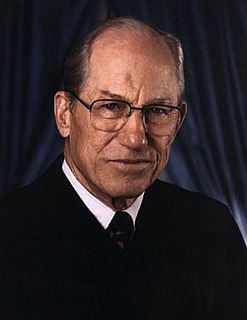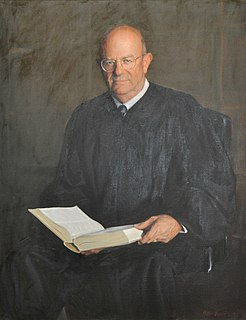A Quote by A. V. Dicey
Our constitution, in short, is a judge-made constitution, and it bears on its face all the features, good and bad, of judge-made law.
Related Quotes
People must be confident that a judge's decisions are determined by the law and only the law. He must be faithful to the Constitution and statutes passed by Congress. Fidelity to the Constitution and the law has been the cornerstone of my life and the hallmark of the kind of judge I have tried to be.
Every single person in the government swears an oath to the very same constitution, to abide by the laws in pursuance of this constitution, and they all have the responsibility to follow its plain words....If a judge makes a ruling that is contrary to the plain words of the Constitution, then it's not law, it's just his bad opinion!
The sovereignty of the States is the language of the Confederacy and not the language of the Constitution. The latter contains the emphatic words. This Constitution and the laws of the United States which shall be made in pursuance thereof and all treaties made or which shall be made under the authority of the United States, shall be the supreme law of the land and the judges in every State shall be bound thereby, anything in the constitution or laws of any State to the contrary notwithstanding
Whether a law be void for its repugnancy to the Constitution, is, at all times, a question of much delicacy, which out seldom, if ever, to be decided in the affirmative, in doubtful case. ... But it is not on slight implication and vague conjecture that the legislature is to be pronounced to have transcended its powers, and its acts to be considered as void. The opposition between the Constitution and the law should be such that the judge feels a clear and strong conviction of their incompatibility with each other.
[A]s it must be admitted that the remedy under the Constitution lies where it has been marked out by the Constitution; and that no appeal can be consistently made from that remedy by those who were and still profess to be parties to it, but the appeal to the parties themselves having an authority above the Constitution or to the law of nature & of nature's God.
The Court is most vulnerable and comes nearest to illegitimacy when it deals with judge-made constitutional law having little or no cognizable roots in the language or design of the Constitution.... There should be, therefore, great resistance to ... redefining the category of rights deemed to be fundamental. Otherwise, the Judiciary necessarily takes to itself further authority to govern the country without express constitutional authority.
In the Laws it is maintained that the best constitution is made up of democracy and tyranny, which are either not constitutions at all, or are the worst of all. But they are nearer the truth who combine many forms; for the constitution is better which is made up of more numerous elements. The constitution proposed in the Laws has no element of monarchy at all; it is nothing but oligarchy and democracy, leaning rather to oligarchy.



































